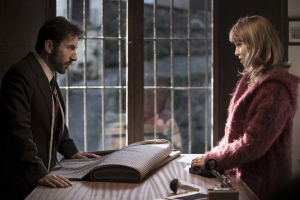
I made no secret of being a huge booster of last year’s short film Sunspring–I wrote not just a glowing review of it here, but also a lengthy defense making the bold claim that it’s the most important screenplay of my lifetime. Big shoes to fill, certainly, but at least for me, calling Sunspring my favorite film of 2016 (and one of my favorites ever, honestly) was not just an easy choice, but a natural one, no back and forth debate with myself but sheer confidence of what it made me feel. And now, in 2017, my best computer friend Benjamin has gone and written another film–or, rather, he wrote a whole lot of things that congealed into a film, stitched together from sets of unrelated data into something even stranger, both more “human” and more opaque, a recapitulation as much as a creation. Sunspring was an announcement of his (and Ross Goodwin, his programmer, and Oscar Sharp, the director responsible for enacting his strange requests) talent, but It’s No Game–featuring the likes of David Hasselhoff, no less–is testing the limits of his methodology, losing focus but widening expressive potential. It’s growing pains, if you will (though please forgive the negative connotation there).
It begins as a comedy goof on the dark, automated future I foretold in my aforementioned piece, with two writers (representing writers leagues West and East) being told that the terms of their unions will no longer be accepted by Fair Game films. The reason? Benjamin himself, who after being trained on sci-fi screenplays previously, has had his worldview reconfigured multiple times to drill down and get specific, whether that be in belching out reconfigured Shakespeare, choreographing ballet performances, or rebuilding David Hasselhoff himself into a recursive articulator of things he’s already articulated. The strangest part? The first segment that sets this up wasn’t written by Benjamin, at least as near as I can tell: where the other parts here contain a lot of his odd, jumbled charm, our two writers’ guild stand-ins and the executive they talk to speak like people in movies speak. Their words were consciously decided instead of generated. When we break into generated dialogue again, it almost feels more natural because of the expectation created previously. When near-apocalyptic visions of transhumanist machine-human convergence rear their ugly heads, when the machines are watching machines create for machines, when David Hasselhoff monologues to close out the short, much as Sunspring ended, it feels more emotionally stirring in its abstraction. But why?
“I don’t know who the hell I am,” Hasselhoff says. “I want to be a man.” We can take these words and provide them meaning–in the short, Hasselhoff has lost control of his own body. He’s been turned into a version of himself that was dictated by his performance of other peoples’ words. But here’s the kicker, and the one that the non-Benjamin creators of It’s No Game make central through the combination of “human” and “machine” intelligences and creative drives: it doesn’t actually mean anything until we bring ourselves to it. That monologue was never “intended” to match up with the other, hermetically-separated moments of Benjamin’s generating. It’s an accident, but its meaning is not accidental–it’s a machine moment given meaning through human intervention (both on the part of the filmmakers, and on the part of the viewer). Where Sunspring expressed the instability of its meaning through its language, It’s No Game expresses this through its construction. We’re shown the seams directly, and we have to confront them constantly.
It’s No Game‘s similarities to its predecessor (a beginning section focused on dialogue, a middle section that’s mostly wordless and visually oriented, and a final closing monologue) makes it into a kind of Spanish language version of 1931’s Dracula. For those unaware, Hollywood in its old days sometimes made alternate language versions of its films–not just dubs, but completely separate productions, intended for other markets–and the classic horror film Dracula has a Spanish-language twin (usually referred to as Drácula–note the accent marker). Being able to watch the dailies of the English-language Dracula before working on the same sets at night, the cast and crew of Drácula often made choices based on what they saw as not working in those very dailies. Essentially, it’s a re-do of themes, made by those who already saw the original during its creation. But where Drácula used its reflexivity to create a more atmospheric, consistent work (honestly, check it out if you haven’t- besides Bela Lugosi’s performance, it trumps the English-language version handily), It’s No Game looks back on its predecessor and fractures it, splitting itself at the seams to make them even more visible.
That visibility is exactly what makes it as fascinating as Sunspring, if less immediate and emotionally affecting. Sunspring seemed to be perfectly formed out of the gate, a precise use of what in sloppier hands might otherwise be called a gimmick, and having proved himself, Benjamin made his messy sophomore album, taking a proof of concept and saying hey, that was cool, and now that you believe me, here’s a dozen other ways you can take this. Not just Benjamin, of course- the human element in It’s No Game is more present than ever, and continues to show that good direction can make even the most unwieldy dialogue sound oddly natural, like if you just turned off certain parts of your brain it’d sound perfectly normal–half-listening, there’s nothing off about it. But what’s so promising about the work being done in the field of AI-art (Kristen Stewart’s quite interested in machine learning as well, using a process she calls “style transfer” in her short film Come Swim) is its jaggedness and its possibilities, the things that haven’t been hammered out (and maybe shouldn’t be), the million avenues that haven’t been walked down but that It’s No Game hints at (for my personal taste, the ballet section holds the most interest- we haven’t even scratched the surface of the types of art forms that can be given this treatment). Long live our computer collaborators.
—
It’s No Game can be veiwed here
Directed by Oscar Sharp; written by Benjamin 2.0, an AI written by Ross Goodwin, and Oscar Sharp; starring David Hasselhoff, Tom Payne, Tim Guinee, Sarah Hay, and Jake Broder; 8 minutes.

![Short Cuts: [REDACTED] & More](https://dimthehouselights.com/wp-content/uploads/2015/01/shortcuts-300x150.jpg)

 Derek
Derek
 Isabelle
Isabelle